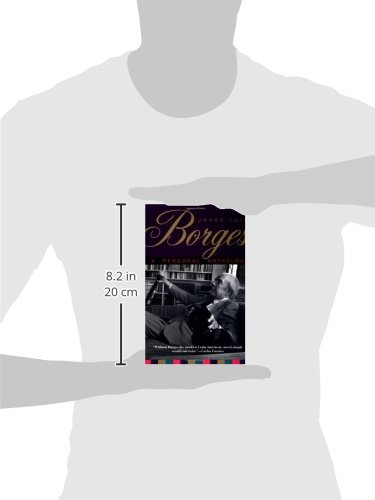Deliver to Philippines
IFor best experience Get the App




A Personal Anthology
Y**R
Borges and I, I and Borges
§ Borges is not a particularly good stylist, his craftsmanship would not compare to other eminent writers.§ The substance of his work, on the other hand, is quite complex and sophisticated.§ Borges was at his best in essay-writing, second in story-telling, and third in poetry.§ His poems I thought were subpar, or they could be lost in translation.§ The first two short stories I thought were brilliant: The South and The Dead Man.§ The End, The Secret Miracle, Circular Ruins, and Funes, The Memorious were good.§ El Aleph and Zahir left me cold. Ironic because I was looking forward to reading these two the most.§ Borges is worldly wise; his writings replete with references to India, China & above all, the Near East.§ Watch Buckley’s interview with Borges before reading this book.
K**N
Challengingly erudite assortment of fiction, poetry, and essays
Argentinian author Jorge Luis Borges (1899-1986) is one of Latin America’s most critically acclaimed authors. Borges was a prolific all-around man of letters who published so much fiction, nonfiction, and poetry that no one seems to have compiled an authoritative bibliography of his work. In 1961, Borges published A Personal Anthology, a sort of self-retrospective of his career up to that time, edited by himself. Translated into English in 1967, the contents of the volume are comprised of short stories, poems, and essays—48 pieces in all—all of which are quite brief. Some of the selections are so short they can best be described as observations.A fraction of the pieces included here are set in Borges’s native Argentina. In such stories, which sometimes take the form of westerns (or in Argentina’s case, southerns?), Borges contrasts the European culture of metropolitan Buenos Aires with the rugged gaucho life of the surrounding rural pampas. In stories like “The South,” “The Dead Man,” and “The End,” characters try to navigate from one world to the other and often find themselves in over their heads.Beyond his tales set in South America, the writer Borges most calls to mind is Umberto Eco. The scope of Borges’s writings encompasses all of world history, including ancient and medieval times. Like Eco, Borges has a particular fascination for books and writers of the past, of all languages, and he demonstrates his encyclopedic mind through frequently arcane references. Unlike Eco, who seems to take pride in educating his readers on the world’s intellectual history, Borges just assumes you already know what he knows. While one can’t help but admire his impressive erudition, one also has to wonder if many of the critics and fans who praise Borges really understand what he’s saying much of the time.Many of the briefer entries in this work, fiction and nonfiction, do little more than draw connections between historical figures and books from different corners of the globe and different eras in time, as if Borges were engaging in the mental gymnastics of Hermann Hesse’s The Glass Bead Game. This intellectual pinball makes his poetry quite interesting and enigmatic. In his fictional narratives, Borges defies conventional rules of storytelling. Even time itself doesn’t necessarily follow a linear path, and he often injects himself into his stories, blurring the line between author, narrator, and character. Such quirks feel appropriate in works that touch on science fiction and fantasy, like “Funes, the Memorious” or “The Aleph,” but often feel obtrusive elsewhere.I don’t know if any of the writings in A Personal Anthology can be considered among Borges’s best work, but the volume overall, in presenting an ample and diverse selection of his work, serves as a fine introduction to his writing for the novice. That doesn’t mean that all the works included make for a satisfying reading experience. It seems as if the selections were chosen for their brevity, and they often feel more like incomplete sketches than fully realized ideas. Borges’s narratives are often frustratingly disjointed, and his style is a little too arty and pretentious for all but the highest denizens of the ivory tower to enjoy. If I had to judge his career on A Personal Anthology alone, the verdict would not be entirely favorable, but this collection did pique my interest enough to want to delve further into his extensive bibliography.
A**B
Borges for beginners
One of the stories in this anthology, The Aleph, was mentioned by Cormac McCarthy in his novel, Stella Maris. This prompted my interest in Borges and I found The Aleph contained here. A Personal Anthology includes poetry, short stories and historical articles representative of Mr. Borges' style. Be ready to have your vocabulary expanded!
T**E
The best short collection of Borges
Borges's favourite works at the time, arranged as he wanted them to be. Covers a variety of poetry, fiction, nonfiction, and work that is somewhere in between, which is what Borges does best. The best introduction to his work available.
Z**A
Incorrect listing title
This is titled “Ficciones” but is not Ficciones. It’s a different compilation of Borges’s work.
N**D
Borges is WONDERFUL
Lovely
H**I
Five Stars
Clean good condition, and a fabulous read.
K**T
you love him or you don't
It's Borges....you love him or you don't. I happen to love him.
N**D
Bought as a Christmas present for a literary recipient who ...
Bought as a Christmas present for a literary recipient who was looking for something by the author. He was over the moon with this gift.
Trustpilot
2 days ago
5 days ago